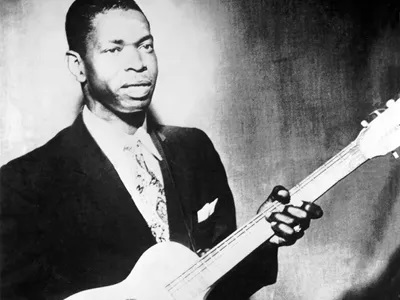Elmore James, often hailed as the “King of the Slide Guitar,” was a pioneering blues musician whose electrifying sound helped shape the course of modern blues and rock music. His raw vocals, intense slide guitar technique, and emotionally charged performances made him one of the most influential figures in blues history.
Early Life and Musical Beginnings
Elmore James was born on January 27, 1918, in Richland, Mississippi, under the name Elmore Brooks. Raised in the heart of the Mississippi Delta, he was exposed to the blues from an early age. He built his first makeshift guitar using a broom wire nailed to the wall, an early sign of his resourcefulness and deep passion for music.
As a teenager, James played in juke joints and at local gatherings, honing his craft under the influence of legendary bluesmen such as Robert Johnson and Son House. His distinct slide guitar style was inspired by Johnson’s recordings, particularly “Dust My Broom,” which would later become one of James’s signature songs.
Rise to Fame
Elmore James’s big break came in 1951 when he recorded “Dust My Broom” for Trumpet Records. The song, a reworking of Robert Johnson’s original, featured James’s searing slide guitar sound played through a distorted amplifier, giving it a raw and electrifying energy. The track became a massive hit, reaching a wide audience and cementing James’s reputation as a force in the blues world.
Following this success, James recorded a string of influential blues songs, including “The Sky Is Crying,” “Shake Your Moneymaker,” “It Hurts Me Too,” and “Standing at the Crossroads.” His music was characterized by powerful vocals, driving rhythms, and a distinctive slide guitar technique that set him apart from his contemporaries.
Musical Style and Influence
Elmore James’s sound was groundbreaking. His use of amplification and distortion was ahead of its time, paving the way for the electrified Chicago blues scene. His slide guitar playing, often performed on a modified Kay or Gibson guitar with heavy reverb, influenced countless musicians, including Eric Clapton, Duane Allman, Stevie Ray Vaughan, and George Thorogood.
James’s recordings with labels such as Chess, Fire, and Vee-Jay showcased his ability to blend traditional Delta blues with the emerging electric blues sound, making his music accessible to a broader audience. His emotionally charged performances resonated with listeners, and his dynamic stage presence made him a captivating performer.
Personal Life and Challenges
Despite his musical success, Elmore James faced numerous personal challenges. Like many blues musicians of his time, he struggled with financial instability and health issues. He had a longstanding heart condition, which was exacerbated by his rigorous touring schedule and lifestyle. James was also known for his love of whiskey and his fiery personality, which sometimes led to conflicts within the music industry.
Legacy and Death
Elmore James passed away on May 24, 1963, at the age of 45, due to a heart attack. Though his life was cut short, his impact on the blues and rock music remains profound. His songs have been covered by a wide range of artists, and his pioneering slide guitar technique continues to inspire musicians across genres.
James was posthumously inducted into the Blues Hall of Fame in 1980 and the Rock and Roll Hall of Fame in 1992. His influence can be heard in the music of The Rolling Stones, Fleetwood Mac, and countless blues and rock musicians who followed in his footsteps.
Conclusion
Elmore James’s legacy is one of innovation, passion, and raw musical energy. His mastery of the slide guitar and his ability to convey deep emotion through his music have earned him a lasting place in the annals of blues history. Today, his recordings continue to inspire new generations of musicians and blues enthusiasts, ensuring that his contributions to the genre will never be forgotten.


Comments are closed